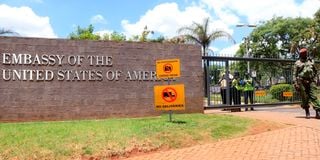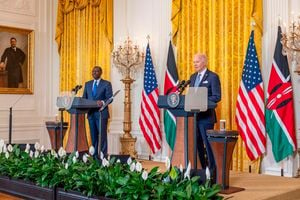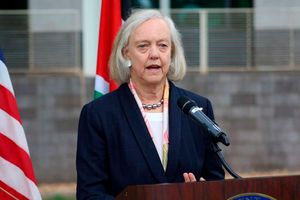
US embassy in Nairobi.
The US Embassy in Nairobi has resumed ‘normal service’ of swift criticism of rights abuses in Kenya, a momentous step after what seemed in the past to be all business.
It also signalled an intention to revive the stalled peace bid in the Democratic Republic of Congo, a project led by former president Uhuru Kenyatta.
A day after activists were violently dispersed in Nairobi while protesting against cases of femicide, the Embassy in Nairobi, now under Charge d’Affaires Marc Dillard, expressed concern at the brutal crackdown on Kenyans exercising their rights.
"[It is] Regrettable and concerning to see police action against Kenyans exercising their constitutional rights to assemble and protest peacefully,” the mission said in a post on X on Wednesday, December 11.
“On International Human Rights Day and every day, the United States supports efforts to #EndFemicideKE and protect the human rights of all people,” it said.
The activists had assembled in Nairobi and other major towns in Kenya to mark the end of 16 Days of Activism against Gender-based Violence, a period dedicated by the UN to sensitise the public on gender-based violence.
This year’s theme was ‘a time to act now.’ But for Kenya, it came after a painful spike in reports of murders, most of them of women, a trend that had prompted the president to announce special programmes to tackle the crimes.
Police acted swiftly, dispersing the protesters as they assembled at Jevanjee Gardens and arresting others.
One of the notable arrested people was Irungu Houghton, the Executive Director of Amnesty International, one of the rights watchdogs that have been critical of police brutality this year.
For the US Embassy, however, this statement was notable for its immediacy.
Under the former Ambassador Meg Whitman, the mission took a few more days to criticise the police when they bludgeoned Gen-Z protests earlier in the year.
As protests continued, it called on police to "exercise restraint and protect the right of people to demonstrate peacefully" and urged "provocateurs and opportunists to avoid blocking roads and looting shops".
“All actors – police and protesters alike – should repudiate violence and be held accountable for wrongdoing.”
While the US has often insisted that its values of democracy and governance remained intact, the US Embassy in Nairobi had been a notable omission when most Western diplomatic missions have called for investigations into the abductions and disappearances of people deemed critical of the government.
Before she left, however, Ms Whitman clarified the US had always been “frank about the co-values that Kenya and the US share” whenever she held talks with President William Ruto.
Meanwhile, the US and the UK have signalled their intention to help revive the Nairobi Peace Process, a peace mediation project for eastern DRC.
Mr Dillard and UK High Commissioner to Kenya Neil Wigan separately paid a courtesy call on former President Uhuru Kenyatta at his home in Gatundu.
“Their discussions focused on the Nairobi Peace Process and regional peace initiatives,” a dispatch from the former President’s office said on Wednesday.
If the two governments resumed the programme, it would be a significant step that had almost died under Whitman’s tenure.
To be fair, though, it may not be the former Ambassador’s fault. Kenya and the DRC have had frosty relations for the past year, with Kinshasa refusing to accredit Kenya’s envoy to DRC, a subtle protest at Nairobi for hosting a rebel movement.
Those rebels under the Alliance Fleuve Congo banner have since been sentenced to death in absentia, but Nairobi had long refused to deport them, citing their freedom of speech when they criticised President Felix Tshisekedi.
This simply meant that Nairobi was now a hostile or partisan actor in the conflict.
Beyond the bilateral ice, the relationship between President Ruto and his predecessor Kenyatta has only recently improved.
They didn't meet physically for a year, which meant that the mediator couldn't brief the president on developments in the DRC.
Meanwhile, the standoff on whether the M23 rebel group should be a part of armed groups meant to discuss peace with their government in Nairobi also fuelled the stall.
Kinshasa accuses M23 of being terrorists while peacemakers say long-term stability cannot be found if some groups are isolated.
As it is, the DRC says it can only negotiate with M23 if they surrender arms.












